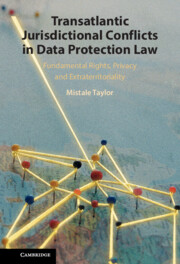 Transatlantic Jurisdictional Conflicts in Data Protection Law
Transatlantic Jurisdictional Conflicts in Data Protection Law Published online by Cambridge University Press: 06 April 2023
Generally, where the US prioritises freedom of expression as enshrined in the First Amendment to the US Constitution, the EU favours the right to privacy. The freedom to impart and receive information is an important component of freedom of expression. The right to erasure (‘right to be forgotten’) as articulated by the Court of Justice of the EU in its 2014 Google Spain judgment, whereby search engines must delist certain results upon requests from EU data subjects, and its subsequent implementation, show transatlantic divides over the right to freedom of expression vis-à-vis data privacy rights. In an attempt to combine fundamental rights concerns, permissive principles of jurisdiction, and questions of connection and reason, the research suggests a way for the EU to exercise jurisdiction regarding the right to erasure that will lessen transatlantic conflicts. Specifically, delisting should not be limited to EU country-specific websites that can easily be circumvented by going to a non-EU version of the same site, but nor should it be implemented globally, thereby subjecting the whole world to EU law. This approach can be applied in future situations where US and EU values, interests and laws on data protection and the freedom of expression collide.
To save this book to your Kindle, first ensure no-reply@cambridge.org is added to your Approved Personal Document E-mail List under your Personal Document Settings on the Manage Your Content and Devices page of your Amazon account. Then enter the ‘name’ part of your Kindle email address below. Find out more about saving to your Kindle.
Note you can select to save to either the @free.kindle.com or @kindle.com variations. ‘@free.kindle.com’ emails are free but can only be saved to your device when it is connected to wi-fi. ‘@kindle.com’ emails can be delivered even when you are not connected to wi-fi, but note that service fees apply.
Find out more about the Kindle Personal Document Service.
To save content items to your account, please confirm that you agree to abide by our usage policies. If this is the first time you use this feature, you will be asked to authorise Cambridge Core to connect with your account. Find out more about saving content to Dropbox.
To save content items to your account, please confirm that you agree to abide by our usage policies. If this is the first time you use this feature, you will be asked to authorise Cambridge Core to connect with your account. Find out more about saving content to Google Drive.